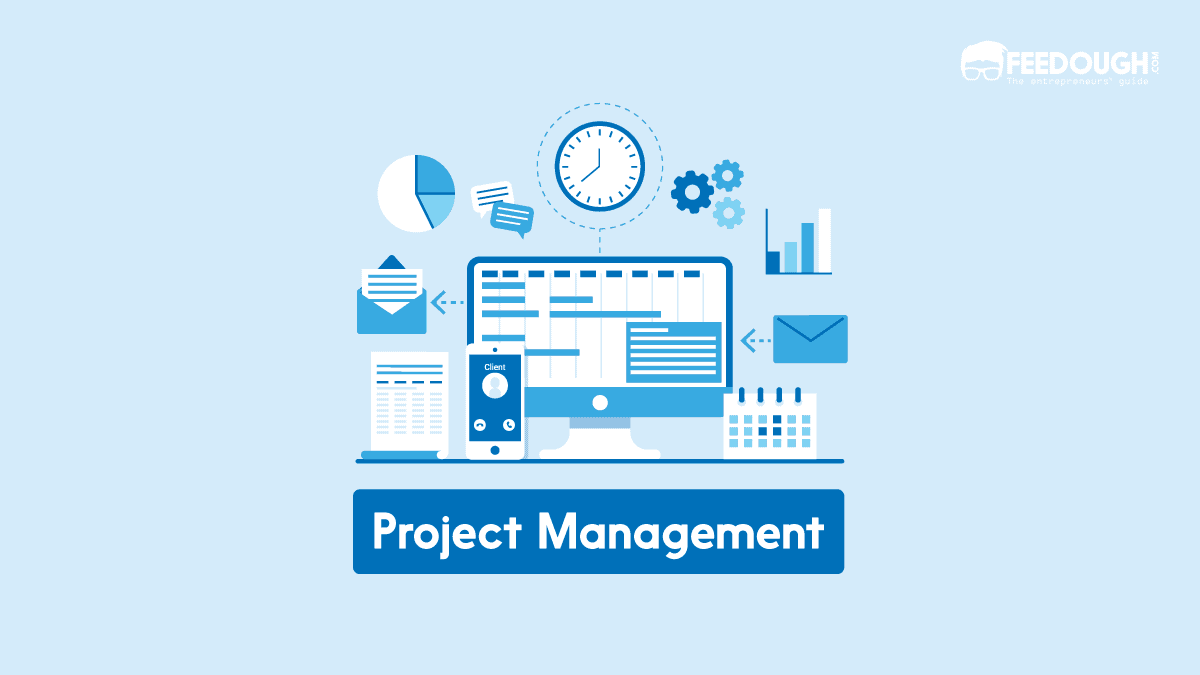Whether large or small, businesses work on plenty of projects simultaneously and in quick succession. These projects demand time, money, expertise, and space. They might bring huge losses if they fail. So, what do you do to ensure the success of a project?
Project management!
80% of high-performing teams are led by a certified project manager. Also, it is claimed that organisations that invest in project management waste 28x less money. No wonder project management has emerged as an in-demand skill!
But, what exactly is project management? Let’s find out.
What Is Project Management?
Project management refers to leading the work of a team working on a project and applying processes and principles to ensure that the entire project is finished within the constraints of budget, time, scope, and quality.
Projects are temporary ventures undertaken by businesses with certain objectives in mind. They aim at producing the desired result, change, product, or service, and are usually complex. Therefore, they require extensive planning, collaboration, real-time communication, and supervision. So, one person is appointed to take care of these and ensure effective execution of a project; thus, project management comes into the picture.
Project management involves taking care of a project from the start till the end. It deals with:
- Discussing with the stakeholders to decide on the scope, quality, and metrics
- Planning
- Developing team schedules
- Assessing and trying to mitigate foreseeable risks
- Initiating execution of the project
- Ensuring real-time communication and collaboration
- Supervising and creating project reports
- Tracking metrics at each stage
- Dealing with unforeseeable risks
- Restructuring the initial plan from time to time (still sticking to the project’s objectives)
- Completion of the project
In other words, project management means ensuring the success of a project by planning and supervising it along the way.
Project Management Example
Suppose Marsha is the CEO of a social media company with 500K+ users. She observes a decline in the rate of increase in the platform’s users and decides to enhance the platform’s video streaming feature. So, she brings together a team of senior employees, asks them to work on the project, and appoints a manager to supervise the work.
The project manager knows that the project’s objective is to enhance the platform’s video streaming feature. For this, he discusses with the CEO, product managers, his subordinates, and even the app’s users to develop a plan. He also creates the timeline of the project with its deliverables. Then, he breaks down the whole process into tasks and subtasks and assigns them to the team. Once the work starts, he assesses and supervises each task at each stage, restructures the initial plan, and realigns the team with the tasks and timeline.
While doing all this, he makes sure that everyone is satisfied, including the team, the CEO, product managers, partners, etc. This is project management.
What are the Objectives of Project Management?
Project management involves supervising all the aspects of a project from start to end. It begins with getting inputs from the project stakeholders (one’s bosses, clients, employees, etc.) and ends in presenting the full project outcome to them. Meanwhile, the project manager is supposed to plan the whole process, see that adequate resources are allotted to each task, supervise the execution, make room for changes, and see that everything is done the right way.
- Planning the whole set of procedures: A business project is usually large and involves various limbs of an organisation functioning together. It is limited by the constraints of scope and resources and needs to be completed within the stipulated time. Also, since too much time and money goes into a project, one needs to plan for risks. So, each phase of a project needs to be planned well beforehand to ensure smooth initiation, development, and completion.
- Allocating resources to different tasks: A business has a limited supply of time, money, people, and other inputs. So, one needs to allocate these resources wisely to ensure the success of a project. This area always has some scope for improvement; one can always brainstorm and alter processes, procedures, and principles to ensure that resources are allocated in the best way. A project manager does this work.
- Supervising the whole project along the way till completion: Once a team has started working hands-on on a project, one needs to track and supervise. That’s a major area where project management comes in. It involves:
- Ensuring effective functioning, communication, and collaboration between various limbs
- Seeing that everyone is on schedule
- Tracking metrics after each stage
- Assessing the quality of work
- Dealing with planned and unplanned risks to mitigate their effects
- Alter the initial plan as required and realign work accordingly.
- Finishing the project the right way: Projects are undertaken with specific and measurable goals in mind. Besides the points mentioned above, project management has to ensure that these goals are accomplished. It is the duty of the project manager to ensure that every stakeholder (bosses, clients, subordinates, etc.) are satisfied. This is why interpersonal skills are a prerequisite for project management.
Why is Project Management Important?
Project management has emerged as an in-demand skill. While large enterprises hire project managers regularly, new businesses have their executive members working in the role. So, why is project management this crucial?
It Defines The Purpose And Value Of The Project
Projects are undertaken with goals in mind. They serve some purpose to the organisation, clientele, and/or customer segment. So, before a project starts, the project manager gets in touch with the immediate stakeholders and defines its purpose and value. This way everyone understands if the project is necessary and what value it will provide. So, they are more involved, aware, and know where to direct the project in case some problems arise.
It Brings Order To A Project
Projects involve various objectives, constraints, principles, and processes. They are so vast and complex that it is difficult to align every limb and ensure timely and quality work. One also needs to account for uncertainties, risks, and alterations. As such, it is good to have one person planning and supervising the whole process.
The project manager creates plans, manages the team, monitors each one’s job, develops reports, assesses risks, and ensures quality. This helps streamline the whole project processes, procedures, and principles with the execution.
It Keeps Everyone Focused
Projects are complex; they require lots of brainstorming, collaboration, real-time communication, time management, and risk and quality control. As such, it is easy to lose focus. This is where project management comes into the picture.
The team is more likely to stay focused and accountable with objectives, principles, plans, procedures, briefs, and outlines in place. They know that their work quality is being monitored and any success or failure will be duly considered. Moreover, project managers make everyone understand the importance of their work; this further ensures cooperation. Also, since everyone knows whom to contact in case of queries or inconveniences, there isn’t an unnecessary roadblock.
It Ensures Communication And Collaboration
Projects are more dependent on a company’s human resources than on other inputs. They are vast and demand everyone to work in sync, which is tough, especially in remote work. So, it is the job of the project manager to ensure communication and coordination among all. They make sure that every task is finished on time, everyone is in the loop, and work proceeds smoothly.
It Brings Leadership, Supervision, And Expertise To Work
Project managers are leaders; they have learned a fair bit about different aspects of projects and risen to the occasion. They have the potential to oversee everything and ensure that things fit perfectly into the bigger picture. Many a time, they directly influence the seniors and clients about expectations and demands. They present project reports to the stakeholders and offer expert opinions to all.
It Lets One Control Quality And Manage Risks
While time, budget, and scope have been the majorly talked about project management constraints, quality has lately emerged as an important determinant. It deals with the purpose of the project and the satisfaction of the stakeholders. Also, since projects involve huge expenditures, one cannot afford them to go bad.
When the team is on the ground, various factors come into play and generate risks because things may not go as planned. One may find the budget short of what is required, the team not collaborating efficiently, work not being up to the mark, things getting rushed, etc. So, you need to:
- Prepare and study progress and performance reports in comparison with the initial plan
- Assess the metrics (like ROI) at each stage
- Restructure the initial plan after considering new risk
The project manager essentially does all these tasks. They ensure that everything is proceeding as required and the expected results are delivered.
Now, the actual outcome will almost always differ from the expected one, but this difference is controlled by project management.
It Lets The Organisation Learn From Successes And Failures
Each stage of a project has its problems and success depends on how they are tackled. So, you need one supervisor to assess and track the problems, successes, and failures throughout the project life cycle. Project management involves keeping account of these so that, after each project, the organisation has learned some more.
What Are the Phases of Project Management?
The whole project management is divided into five phases.
- Initiation: It involves establishing the project’s needs, constraints, and the appointing of a project manager.
- Planning: It’s where the manager plans and sets goals and create a roadmap that everyone will follow.
- Execution: It is where the work gets done. The team in the execution stage works on and completes the project deliverable according to the project plan and roadmap.
- Supervision (monitoring and control): Usually, this stage starts along with execution and involves the project manager verifying and controlling the scope, calculating KPI’s (Key Performance Indicators), and making course corrections as necessary.
- Completion: It’s the end of a project where the team evaluates and documents its project and move on to the next one.
The work starts when a project gets approval (in the initiation phase) and ends when the project manager hands over the deliverables to the stakeholders (in the completion phase). The process includes planning the whole project lifecycle, executing the plan, and monitoring and controlling work to produce the desired results.
What Are Project Management Methodologies?
A project management methodology is the set of principles and practices followed during the process of project management. Each project has different needs depending on the team type, project scope, budget, industry, and other factors. So, it is a part of project management (that is, the role of a project manager) to select the right project management methodology.
A few of the most widely used project management methodologies are:
- Waterfall
- Agile
- Scrum
- Hybrid
- Lean
- Six Sigma
- PRINCE2 (Projects in Controlled Environments)
What Are Some Project Management Tools and Techniques?
Appointing the right project manager and selecting the right methodology isn’t enough for successful project management. It is a complex task and one needs to use different tools and techniques wisely for this purpose.
A few of the widely used project management tools are:
- Gantt Chart
- Work Breakdown Structure (WBS)
- Fishbone diagram
- Decision tree
- Stakeholder matrix
- Spider chart
Some renowned project management techniques are:
- RACI
- SWOT analysis
- Program Evaluation and Review Technique (PERT)
- Critical Path Technique (CPT)
What Is The Difference Between Project Management and Business Management?
As mentioned before, projects are temporary endeavours with specific objectives. They have a start and an end date. New teams are formed for new projects; these people may be doing tasks that are not their regular. Also, unique plans and processes are developed to manage these projects, which may not be used after their completion.
On the other hand, businesses continue indefinitely (if owners aren’t planning to shut them down soon). So, one has to manage permanent teams and processes or business management is a repetitive and continuous process. It doesn’t have fixed objectives but is based on the businesses’ short and long-term goals. Moreover, the teams supervised by a business manager aren’t formed for a short period. These people are doing their everyday tasks, just like the business manager.
Project Management | Business Management | |
|---|---|---|
Scope | Covers one project | Covers the entire business |
Nature | Temporary (with a start and end date) | Permanent and continuous |
Processes used | Unique, dismantled upon project’s completion | Repetitive |
Objectives | Clearly defined | Vague short and long-term goals |
Role of the team | Do things out of their usual tasks | Do their daily jobs |
What Is The Difference Between Project And Product Management?
While a project is any temporary endeavour by a business organisation, a product is any physical object, software, or service that satisfies the needs of a consumer group. While a project is undertaken to bring about a specific result (a product, service, change, or anything else), a product is all about customer satisfaction. It goes through a life cycle of development, introduction to the market, growth, and retirement and is not temporary. It adapts to the needs of the market and stays till profitable.
Since projects and products differ this much, so does their management. While project management deals with leading a project from start to the end, product management is about supervising a product’s ideation, introduction, and growth till it gets redundant.
Moreover, a product’s lifecycle involves various projects. Here, product management may include the supervision of a project manager. In other words, product manager becomes a project’s stakeholder in this situation.
Project Management | Product management | |
|---|---|---|
Scope | Covers one project | Covers a product’s whole lifecycle (includes several projects) |
Duration | From initiation to the completion of a project | From when the product is not thought of to its retirement |
Nature of the team | Temporary | People from various departments |
Role of the team | Do things out of their usual tasks | Do their regular job |
What Is A Project Management Software?
As the name suggests, project management software is the application that assists in project management. It streamlines project planning, scheduling, resource allocation, team management, quality control, risk management, and strategic realignment. In other words, project management applications automate the whole project lifecycle.
One of the best project management for small and medium businesses is PaymoTM. It provides all-in-one services at an economical rate and streamlines the whole project lifecycle. However, if you are a solopreneur or a project manager who works independently, Plutio might be a better choice. (You can even get 10% off on Plutio if you use this coupon – Plu20io19)
Some software, like Basecamp and Time Doctor, assists in managing the team instead of the whole project lifecycle. They are suitable for small businesses that prioritise team communication and productivity, respectively.
Go On, Tell Us What You Think!
Did we miss something? Come on! Tell us what you think of this article on what is project management in the comments section.
A finance enthusiast, literature beau and lifelong learner. Working her way up the success ladder and her personal philosophy textbook, Kavvya believes that a good conversation is worth more than a good book. When not working, she can be found reading, writing and engaging in long walks.









